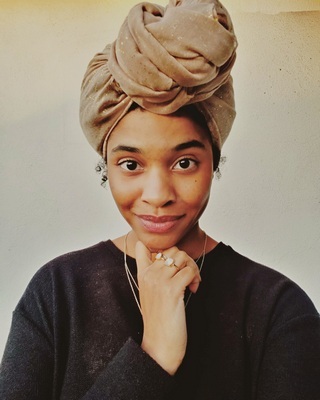
At the end of August, I went to the beach for the first time this summer with my mom. This beach is fairly out of the way and there was scarcely anyone there. The other beachgoers who were there were masked, and there was a persistent wind that kept the air around us moving and had me chilled by 6 PM. It was a moment of pause for us. Rest. I think we both fully relaxed for the first time since March. There’s always been something healing about the water, soothing about the shore. And being there for those few hours was like a balm.
After a small takeout dinner and a walk on the shore to watch the sunset, we headed back to the car. As I settled into the passenger seat, I checked my Instagram and saw a picture of Chadwick Boseman. I immediately liked it and kept scrolling, noticing a few seconds later that I had a DM. It was from a dear, close friend and said, simply, that Chadwick Boseman had died.
Without replying I went back to look at the picture I’d just liked and actually read the caption. I still can’t describe the shock that rippled through me in that moment. I jumped on Twitter and saw the sweet face of Mr. Boseman spread across the trending page with the legend that he had died from colon cancer in bold at the bottom of his photo. My mouth must have been open because my mom asked me, panicked, what had happened now? When I told her, I saw my shock and bewilderment mirrored on her face. In the next few moments I sank into a deep dive of the news, caught between confusion and utter disbelief.
As the story came together that night, the shock didn’t lift. I texted my sister and messaged my friend back, and a few other friends messaged me, asking if I’d heard the news. In each exchange the shock persisted. Numb doesn’t begin to describe the feeling. It’s been nearly three weeks now and I haven’t cried, and not because this was a celebrity death and not the passing of someone I actually knew. I think it’s fair to say the Black community feels like we did know Chadwick, and that he knew us. There was a connection in who he was and what he did that made him a brother and a friend, and his loss is profound. I want to cry for him. I feel it in my chest and my stomach, but the tears haven’t come. In that first moment though, reading the caption beneath the black and white picture of him smiling his million-dollar smile, that first hit of a new and horrible reality was more than just shocking—it was hollow.
If you’ve been paying attention at all, the last full week of August was a week of heightened trauma and mourning. The world watched as Jacob Blake, a Black man who had pulled over on the road to break up a fight, was shot seven times in the back. He was unarmed. His children were in the car and witnessed their father shot execution-style. Yet he miraculously survived.
It’s no secret I believe in God, and with that belief comes a belief in miracles. This year feels like it has had precious few miracles, and after months of headlines about Black men and women killed at the hands of police, Jacob Blake’s story is disorienting at best, his survival a miracle.
I’ve stood on the periphery as more news about him has come out. As headlines about a 17-year old white supremacist who shot and killed two protestors in Kenosha, WI have surfaced and, just as miraculously, received praise. This 17-year old has been called an American hero. The headlines tell us that cops in the area saw him walk by with an AR-15 in a crowd and let him pass. They gave him water and thanked him for his support. After he’d murdered two people. After he’d crossed state lines with an illegally-owned weapon. Meanwhile, Jacob Blake was handcuffed to his hospital bed. Imagine, a man recovering from seven bullet wounds handcuffed to his hospital bed.
I’ve stood on the periphery watching the news from a distance because I can’t take it anymore. I’ve stopped taking walks in my neighborhood because I’m afraid to be out in the open as a Black woman on her own. When I leave the house, I want someone with me because I feel like a target and there’s some safety in numbers. When my dad runs to the store I try not to imagine opening my Twitter and seeing a viral video of some violence against him in a parking lot or at a stoplight. If you’re not getting the gist, what I’m saying is that we are surrounded by Black death. It looms over us figuratively and literally. I haven’t become so desensitized as I’ve grown (even more) traumatized. These headlines don’t hit me like they used to because, in this regard, I am numb. Comatose. Catatonic.
Seeing that headline on August 28 was nothing more than another swipe of the scythe against a Black life. I want so badly to cry—for Ahmaud, for George, for Breonna, for Jacob, for Elijah, for the ridiculous amount of Black people on a list that won’t stop growing, for Chadwick. But black death has become so commonplace that I’m empty. Exhausted. I have wells of deep sorrow within me but nothing to show and no release.
Chadwick’s sudden passage at the end of a week of such violence and mourning felt like a cacophonic crescendo—one of many reached in just the last nine months. To see millions of people pouring out love and mourning for Mr. Boseman feels both wrong and right, absolutely deserved but disgustingly premature, and even a little puzzling because it’s clear that his was a black life that the world agrees mattered in a time when it seems too many do not.
To be clear: Chadwick truly was a real life king. A man of faith. A beautiful, gracious soul. His greatness is reflected in the depth of the heartbreak we all feel. His loss continues to affect me in ways I still don’t understand. Apart from his being another Black death, the loss of someone so good in a world that feels so evil hurts all the more. He brought many Black heroes and icons back from the dead, showing us his love for his heritage in the roles he took on. In T’Challa alone he embodied excellence, goodness, grace, wisdom, strength; he portrayed Black people as we were always meant to be seen—as we are.
I know Wakanda isn’t real. I know that an African nation of affluence and advanced tech and peace built on the back of a wondrous element is fiction. But what we saw? Who we saw? The hope and awe we felt? What Chadwick gave us? That was real. And maybe if the world could take what he gave us and apply that lens, that perspective, to Black death, to Black people gunned down and brutalized every day, they would understand that these premature deaths are tragic. That the ensuing outrage and response is justified. That they should be mourned. A rap sheet or a political stance should not overshadow the fact that Black people are dying disproportionally in this country—from illness, from police brutality, murder, economic conditions that stem from systemic racism—and this is worthy of our heartbreak and passion. The Black death is as real as it ever was, and this year we’ve seen far too much of it.
Keep Jacob Blake in your prayers—that his name is not added to the list. Continue to rest in peace, all those we’ve lost to brutality and violence and who’ve yet to receive justice. And to Chadwick—you are so missed and so loved. Wakanda Forever. God Bless.

















